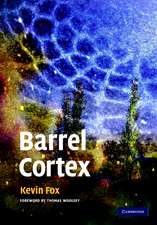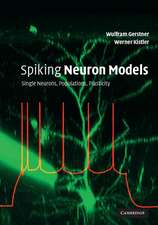Free Will and the Brain: Neuroscientific, Philosophical, and Legal Perspectives
Editat de Walter Glannonen Limba Engleză Paperback – 28 feb 2018
| Toate formatele și edițiile | Preț | Express |
|---|---|---|
| Paperback (1) | 286.13 lei 6-8 săpt. | |
| Cambridge University Press – 28 feb 2018 | 286.13 lei 6-8 săpt. | |
| Hardback (1) | 726.93 lei 6-8 săpt. | |
| Cambridge University Press – 17 sep 2015 | 726.93 lei 6-8 săpt. |
Preț: 286.13 lei
Nou
Puncte Express: 429
Preț estimativ în valută:
54.76€ • 56.96$ • 45.21£
54.76€ • 56.96$ • 45.21£
Carte tipărită la comandă
Livrare economică 14-28 aprilie
Preluare comenzi: 021 569.72.76
Specificații
ISBN-13: 9781108449304
ISBN-10: 1108449301
Pagini: 307
Ilustrații: 2 b/w illus.
Dimensiuni: 153 x 230 x 18 mm
Greutate: 0.41 kg
Editura: Cambridge University Press
Colecția Cambridge University Press
Locul publicării:Cambridge, United Kingdom
ISBN-10: 1108449301
Pagini: 307
Ilustrații: 2 b/w illus.
Dimensiuni: 153 x 230 x 18 mm
Greutate: 0.41 kg
Editura: Cambridge University Press
Colecția Cambridge University Press
Locul publicării:Cambridge, United Kingdom
Cuprins
Part I. Introduction: 1. Free will in light of neuroscience Walter Glannon; Part II. Conceptual Issues: 2. Is free will an observer-based concept rather than a brain-based one? A critical neuroepistemological account Georg Northoff; 3. Evolution, dissolution and the neuroscience of the will Grant Gillett; 4. The experience of free will and the experience of agency: an error-prone, reconstructive process Matthis Synofzik, Gottfried Vosgerau and Axel Lindner; Part III. Mental Capacities and Disorders of the Will: 5. Being free by losing control: what obsessive-compulsive disorder can tell us about free will Sanneke de Haan, Erik Rietveld and Damiaan Denys; 6. Psychopathy and free will from a philosophical and cognitive neuroscience perspective Farah Focquaert, Andrea L. Glenn and Adrian Raine; 7. How mental disorders can compromise the will Gerben Meynen; 8. Are addicted individuals responsible for their behavior? Wayne Hall and Adrian Carter; 9. Assessment and modification of free will via scientific techniques: two challenges Nicole A. Vincent; Part IV. Neural Circuitry and Modification of the Will: 10. Implications of functional neurosurgery and deep-brain stimulation for free will and decision-making Nir Lipsman and Andres M. Lozano; 11. Reducing, restoring, or enhancing autonomy with neuromodulation techniques Maartje Schermer; Part V. Legal Implications of Neuroscience: 12. Neurobiology collides with moral and criminal responsibility: the result is double vision Steven E. Hyman; 13. Neuroscience, free will and criminal responsibility Stephen J. Morse.
Recenzii
'If ever a subject needed multi-author perspectives, it is this one. Free Will and the Brain fulfils a crucial need by bringing together the expertise of philosophers, psychiatrists, neuroscientists and legal experts. It deals with most aspects of this vast subject, but is particularly strong on brain disorders that disrupt free will and their implications for legal decisions. I strongly recommend it!' Peter Clarke, neuroscientist and former Associate Professor, University of Lausanne
'Recent developments in neuroscience, drawing on findings from brain-imaging experiments and the like, have prompted exaggerated and philosophically naïve claims about the 'illusory' character of free will, and have been met with equally ill-conceived criticisms from some scientifically uninformed philosophers. This volume promises to be a valuable corrective to such fruitless debates and a genuine meeting of minds.' Jonathan Lowe, former Professor of Philosophy and Director of Postgraduate Studies, Durham University
'The rapidly accumulating insights into the functions and mechanisms of the brain have rekindled clinical, legal and philosophical interest in the concept of 'free will'. Philosopher Walter Glannon has assembled an expert international team of scientists, clinicians, philosophers and other scholars who dig deeply into the questions of if, and how, neuroscience changes our understanding of free will. Glannon's insightful introduction provides an overview of breadth and substantive depth. His contributors provide the latest and best thinking about this very complex problem.' John Z. Sadler, Daniel W. Foster, M.D. Professor of Medical Ethics, Southwestern Medical Center, University of Texas
'Recent developments in neuroscience, drawing on findings from brain-imaging experiments and the like, have prompted exaggerated and philosophically naïve claims about the 'illusory' character of free will, and have been met with equally ill-conceived criticisms from some scientifically uninformed philosophers. This volume promises to be a valuable corrective to such fruitless debates and a genuine meeting of minds.' Jonathan Lowe, former Professor of Philosophy and Director of Postgraduate Studies, Durham University
'The rapidly accumulating insights into the functions and mechanisms of the brain have rekindled clinical, legal and philosophical interest in the concept of 'free will'. Philosopher Walter Glannon has assembled an expert international team of scientists, clinicians, philosophers and other scholars who dig deeply into the questions of if, and how, neuroscience changes our understanding of free will. Glannon's insightful introduction provides an overview of breadth and substantive depth. His contributors provide the latest and best thinking about this very complex problem.' John Z. Sadler, Daniel W. Foster, M.D. Professor of Medical Ethics, Southwestern Medical Center, University of Texas
Descriere
Examines how neuroscience can inform the concept of free will and associated practices of moral and criminal responsibility.










